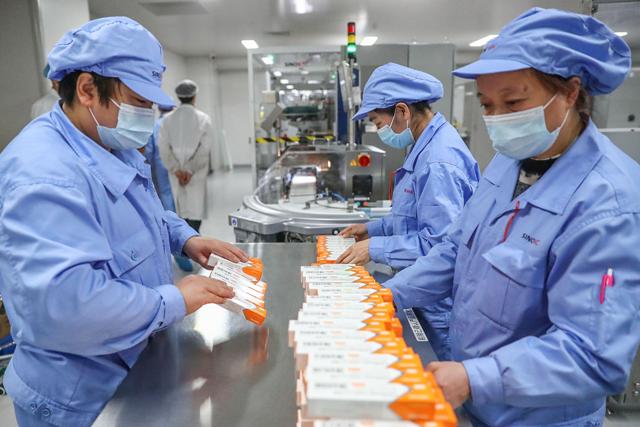 Staff at a COVID-19 vaccine packaging plant of Sinovac Research and Development Co. Ltd. in Beijing. [photo: Zhang Yuwei/Xinhua/Alamy]
Staff at a COVID-19 vaccine packaging plant of Sinovac Research and Development Co. Ltd. in Beijing. [photo: Zhang Yuwei/Xinhua/Alamy]
[This is an excerpt from an article in The Round Table: The Commonwealth Journal of International Affairs. Opinions expressed in articles do not reflect the opinion of the editorial board.]
Despite the COVID-19 pandemic being rampant in India and the country being currently in a public health emergency, many have recently hailed India for its successful pandemic diplomacy both within and beyond South Asia. India’s pandemic diplomacy encompasses several components: first, India’s leadership in pandemic regionalism, which was well evident when India proposed the SAARC (South Asian Association of Regional Cooperation) COVID-19 Fund; second, India’s facemask diplomacy – rapid provision of emergency medical consignments to both neighbouring and other partner countries; and third, and most importantly, the vaccine diplomacy – provision of Made-in-India vaccines under the slogan ‘Vaccine Maitri’ (vaccine friendship). However, when closely observing the country’s approach to the pandemic in early 2021, it is hard to conclude that India’s pandemic diplomacy is progressing. In this piece I review the rise and fall of India’s pandemic diplomacy and argue that poor internal balancing and the decreasing relative power of India, especially relative to China, have combined to wither India’s pandemic diplomacy.
Poor internal balancing is one of the most salient determinants of India’s pandemic diplomacy. Internal balancing, in the academic context of International Relations, is traditionally defined as building indigenous military capabilities anticipating an external threat. In the context of the current health apocalypse, the concept can be expanded to include the efforts to build the internal health capacities of a country. Two major factors are fundamental in building internal health capabilities, (1) institutional commitment: comprised of timely decision making to prevent the spread of the pandemic and a robust health sector to treat the sick; and (2) public commitment: where the populace is self-disciplined to prevent the spread of the pandemic.
India’s inadequate institutional commitment was evident when the government allowed mass rallies during election times and various religious and cultural festivals in early 2021. Critiques argue that missteps of the government and overconfidence created India’s COVID-19 apocalypse. Two factors behind the government’s overconfidence are noticeable: assumptions that the fatal effects of the pandemic will be minimum as the country’s average population is relatively young, and the erroneous predictions that the country would soon achive herd immunity. On the other hand, poor public commitment is evident as only 50% of the Indian population wear facemasks, and of which only 14% wear masks correctly according to a recent study conducted by the Indian government. Indians are, relatively speaking, less attentive to personal sanitation.
The most salient determinant of India’s pandemic diplomacy was the supply of Indian manufactured vaccine to neighbouring and partner countries. From January to June 2021, India has supplied 10.7 m doses to the world as a part of a grant-in-aid programme and 19.8 m doses under the COVAX (COVID-19 Vaccines Global Access) programme. However, with the daily domestic deaths reaching 4,000 in April and May 2021, vaccines running short, hospitals swamped, and a critical shortage of lifesaving oxygen, India’s vaccine diplomacy is withering. India can no longer hail itself the world’s pharmacy, as the Serum Institute of India is facing a production deadlock with limited raw materials, engulfing domestic demand, and unfulfilled promises to the international community for the supply of vaccines.
This marks the drastic downfall of India’s relative power, especially vis-à-vis China. While India is unable to produce adequate vaccines to meet the minimum domestic demand, China, on the other hand, empowered by the United Nation’s approval of Sinopharm and Sinovac for emergency use, is supplying vaccines to the world’s poorest regions such as South Asia, Latin America and the African continent.
Sandunika Hasangani is a Senior Lecturer, Department of International Relations, University of Colombo, Colombo, Sri Lanka.



